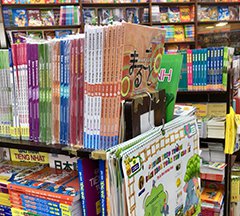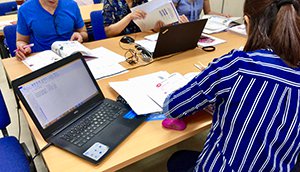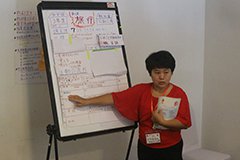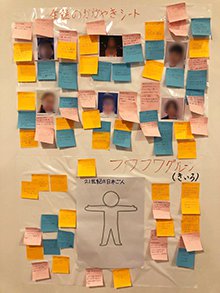Hello from Ho Chi Minh City!
The Japan Foundation Center for Cultural Exchange in Vietnam (Ho Chi Minh City)
ARAI Jun and IGARASHI Yuka
"Marugoto" News
The core of Japan Foundation course activities is, of the Japanese-language course, the "Marugoto: Japanese Language and Culture" (hereinafter “Marugoto”) teaching material based on JF Standard for Japanese-Language Education. Our activities include operating comprehensive Japanese-language "Marugoto" classes, holding information sessions to spread "Marugoto," and holding "Marugoto" study sessions.
To date, Vietnamese-language versions of "Marugoto" from Starter (A1) to Pre-Intermediate (A2-B1) have been published locally, and, even at bookstores in towns where we stopped by, we often saw "Marugoto" textbooks.

"Marugoto" textbooks arranged in a bookstore
New textbooks are of interest to both learners and teachers, so, when new textbooks are published, we regularly hold information sessions and study sessions in order to foster the interest of Japanese-language teachers and students from Vietnam. In particular, at the study sessions, currently active teachers gather, talk about the situations at their educational institutions, and, after analyzing the "Marugoto" teaching materials, work on creating lesson plans and do activities such as mock lessons and reviews.

Teachers preparing for a mock class
Additionally, we also support individual organizations, and if there is a request from an organization that is considering introducing "Marugoto," then we go directly to the school with "Marugoto" textbooks and materials, and discuss/consider with the principle and Japanese-language teachers on introducing "Marguto" teaching materials.
From educational institutions that are actually using "Marugoto," we get feedback and impressions such as "There are quite a few pictures and illustrations, so students who get these textbooks have fun looking through them," and "It makes it easier to envision the actual situation we are working on, so, when they are doing the practice conversations, they get very excited and talk."
We also plan to publish Vietnamese-language versions of Intermediate 1/2 (B1). When it comes to Japanese-language education in Vietnam, many educational institutions focus on Elementary Japanese-language learning, so this year we are looking forward to having an increase in the number of consultations on beginning Intermediate Japanese-language classes.
Japanese Speakers' Forum 2019 in Da Nang
The Japanese Speakers’ Forum (hereinafter "JS Forum"), which is co-sponsored by the Japan Foundation and the Kamenori Foundation, began in 2012, and is a teacher training and mutual exchange program for Japanese-language teachers from five Southeast Asian countries and for high school students from six countries, including Japan. The annual JS Forum was held overseas in Bali, Indonesia in FY2018, and in FY2019 it was held in Da Nang, Vietnam.
The JS Forum consists of a student program and a teacher program, but here we will introduce the nine-day teacher program, in which a total of 11 Japanese-language teachers from five countries participated.

Presenting an improved teaching plan
Thinking about 21st Century Skills
The purpose of the teacher program is to "Reconsider the necessity and definition of 21st century skills, and then improve lesson plans by teachers themselves for aiming to developing those skills." In order to achieve that goal, participating teachers work on things across multiple sessions such as observing students who are participating in the student program, having discussions amongst the participating teachers, and look backing on daily activities with Japanese-Language Specialists (hereinafter "Specialists") who accompanied them from their own countries. The input gained through these activities not only improve the teaching plans that they created as a task in advance of the JS Forum, but also has the teachers output in their knowledge in the form of a play that conveys the importance of 21st century skills to students.
The Students' Brilliance
Additionally, through observing students, we have the participating teachers discover not only the 21st century skills that students are demonstrating, but also the "students' brilliance," that is, the students' own strengths and efforts that appear in the activities. Finally, the participating teachers compile a lot of these "students' brilliance" as message cards and present them to the students, some of whom were so moved that they began to cry.
Changes in Participating Teachers and the Role of Specialists
My role as a Specialist at the JS Forum was to support three teachers from Vietnam who were participating, and their changes over the nine days of the JS forum were incredible. First, as the days went by, they became more familiar with Japanese-language discussions, and the teachers became able to smoothly demonstrate 21st century skills, such as collaboration with other teachers and reflecting on their own work (metacognition). Another big change was the transformation in the way that they perceived the role of teachers. All three of the teachers stated that they understood that they also had the important role of "increasing students' motivation" instead of just rigorously teaching and guiding them. It seems that this is not only because it was their first experience in observing "students' brilliance," but also because they were inspired by the relationships between the participating teachers and students from other countries. They were also surprised that interacting with colleagues from other countries, who are "Japanese-language teachers" just like them, would have such a big impact.

Student observation results
Finally, through participation in the JS Forum, we were able to reconfirm that the relationship between me, a Specialist, and the Vietnamese teachers that we support, is not bound by a one-way arrow of "people who support" and "people who are supported." We want to continue learning together as "Japanese-language teachers" and create relationships that stimulate motivation.
- What We Do Top
- Arts and Cultural Exchange [Culture]
- Japanese-Language Education Overseas [Language]
- Japanese-Language Education Overseas [Language] Top
- Learn Japanese-language
- Teach Japanese-language
- Take Japanese-Language Test
- Know about Japanese-language education abroad
- The Japanese-Language Institute, Urawa
- The Japanese-Language Institute, Kansai
- Japanese-Language Programs for Foreign Specified Skilled Worker Candidates
- Japanese Language Education for Japanese Children Resident Overseas and for the Descendants of Migrants
- Archives
- Japanese Studies and Global Partnerships [Dialogue]
- JF digital collection
- Other Programs / Programs to Commemorate Exchange Year
- Awards and Prizes
- Publications
